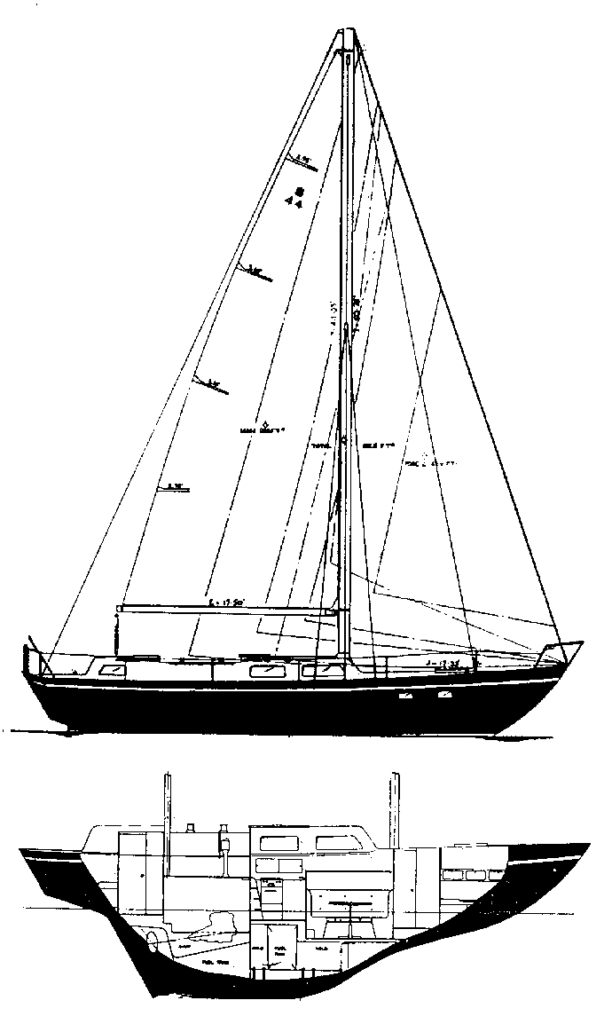The Spencer 44 stands as a testament to the enduring legacy of robust, offshore-capable sailboats crafted in the Pacific Northwest. Designed by the highly respected Canadian naval architect John Brandlmayr and built by Spencer Boats Ltd. of Vancouver, British Columbia, this yacht quickly earned a reputation as a dependable blue-water cruiser. Introduced in 1968, the Spencer 44 encapsulates the builder's ethos of creating high-quality, seaworthy vessels designed to confidently tackle demanding ocean conditions.
Spencer 44 Information, Review, Specs

- Make
- Spencer
- Model
- 44
- Number Built
- 21
- Production Year(s)
- 1968 - ??
History and Design
The Spencer 44 began its production run in 1968, emerging from a modified hull mold of the earlier Spencer 42. This allowed for design flexibility, with many Spencer 44s featuring increased freeboard to accommodate a center cockpit layout, though specific details often varied from one boat to another. The model was offered with both sloop and ketch rig options, providing versatility for different sailing preferences. John Brandlmayr, the prolific designer behind many of Spencer's successful models, prioritized stability, safety, and comfort in his designs, ensuring that Spencer yachts were well-suited for long-distance passages. Spencer Boats Ltd. itself was known for its solid, enduring craftsmanship, building a reputation for producing robust and exceptionally offshore-capable yachts.
Sailing Performance and Handling
The Spencer 44 is categorized as a heavy blue-water cruising boat, known for its rugged construction, graceful lines, and exceptional seaworthiness. With a displacement of 24,000 lbs and a waterline length of 32.5 feet, its Displacement to Length (D/L) ratio of approximately 312 underscores its substantial build, indicative of a vessel designed for comfort and stability in a seaway rather than outright speed. The Sail Area to Displacement (SA/D) ratio, calculated at around 15.95, suggests moderate performance, meaning she is capable of making good progress but is not optimized for light-air racing. Her Ballast to Displacement ratio of roughly 33.3% contributes to a decent level of stability, allowing her to stand up well to wind. Owners frequently praise the Spencer 44 for its solid construction and comfortable motion, affirming its identity as a dependable, offshore-ready yacht capable of safely spending extended time offshore.
Accommodations and Layout
The interior of the Spencer 44 is notably spacious, offering a comfortable and roomy living environment. Many models feature a large interior layout with impressive headroom, often exceeding 6 feet 8 inches in the salon, which also allows for the placement of large ports providing abundant natural light. Typical arrangements include a forward V-berth cabin with a full head and shower, complete with access to the chain locker. A nicely positioned, large aft cabin is also a common feature, particularly in center cockpit configurations, offering a private master suite. The interior often showcases rich woodwork, ample storage solutions, and a practical layout designed for extended cruising. The focus on interior volume and comfort makes the Spencer 44 well-suited for liveaboard cruising or lengthy voyages.
Owner's Perspectives
Owners of the Spencer 44 consistently highlight its robust build quality and its capability as a serious offshore cruiser. Many describe these vessels as "old school" and "well built," capable of safely handling significant time offshore. The general consensus points to the Spencer 44 as a boat that "could last forever," reflecting its durable fiberglass solid hull and deck construction. Sailors are drawn to the enduring quality, seaworthiness, and classic lines that define John Brandlmayr's designs. While specific common problems are not widely documented, the collective experience underscores a vessel praised for its solid construction and comfortable motion in challenging conditions.
Measurements
Construction & Hull
- Construction Material
- Fiberglass (Solid)
- Hull Type
- Monohull Sailboat
- Keel Type
- Long
- Rudder
- 1x —
- Ballast
- 8000 lbs
- Displacement
- 24000 lbs
- Water Capacity
- -
- Fuel Capacity
- -
Engine
- Engine Make
- —
- Engine Model
- —
- Engine Type
- —
- Engine HP
- —
- Engine Count
- 1
- Drive Type
- —
- Fuel Type
- —
Rig & Sails
- Rig Type
- Masthead Sloop
- P (Main Luff)
- 40.8 ft
- E (Main Foot)
- 19 ft
- I (Foretriangle Height)
- 50.75 ft
- J (Foretriangle Base)
- 17.33 ft
- Forestay Length (est)
- 53.63 ft
- Main Sail Area
- 387.6 sqft
- Foretriangle Sail Area
- 439.75 sqft
- Total Sail Area (Reported)
- 827 sqft
- Total Sail Area (Calc)
- 827.35 sqft
Dimensions
- LOA
- 42 ft
- LWL
- 32.5 ft
- Beam
- 11.5 ft
- Draft
- 6.5 ft
- Max Headroom
- -
- Air Draft
- -
Calculations
- Hull Speed
- 7.64 kn
- Pounds per Inch Immersion
- 1